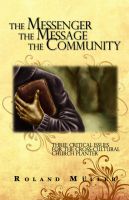This past month, I read Duane Elmer’s book, Cross-Cultural Servanthood: Serving the World in Christlike Humility. Elmer, a former faculty member at Missionary Internship (now MTI) has written a number of helpful books about the process of transitioning into another culture and working effectively as a cross-cultural missionary. Cross-cultural Servanthood addresses the question of what we need to do so that we are actually perceived as servants by the cultures to which we have come. As he points out, servanthood is culturally defined, so our efforts to serve others may actually be perceived as superiority and condescension by the host culture and national church. Elmer has heard many host culture people say, “Missionaries could more effectively minister the gospel of Christ if they did not think they were so superior to us.” How do we unconsciously communicate superiority, and how can we avoid this and demonstrate Christlike servanthood?
One of the chapters talks about the importance of adopting a learning attitude. As missionaries, we often are infected with the “right answer” virus. One of the symptoms of this infection is that we find it difficult to learn from those whom we perceive to be less educated or less spiritual than us. Unfortunately, in my personal experience, the more experienced we are as missionaries, the more virulent this virus becomes. Elmer says to combat this virus we need to take a big dose of humility and learn about others, learn from others and learn with others. Although learning about others is important, we need to move on to learn from and learn with the people of the host culture to which we have been called.
“Learning about others yields facts that help us adjust our expectations and generate fruitful avenues for deeper learning after entering the culture. The danger: we may stop learning and think that now we know everything necessary for ministry It also tends to create ‘we-they” categories.”
“Learning from others yields understanding that moves us into strong, enduring and trusting relationships resistant to colonialistic attitudes and dependency. The danger: we may tire of learning from and move into the telling mode; that is, I have the answers.”
“Learning with others yields authentic partnerships where each probes deeply the mind and heart of the other, bringing interdependent growth and culturally sensitive ministry “We-they” categories are replaced with “us” categories. The danger: I can’t think of any.” (all quotes from p. 102 of Cross-Cultural Servanthood)
Let’s all continue to be good learners, learning not only from people, books, and resources from our home cultures, but also from the people, books, and resources in our host cultures.








1 thought on “Learning and Servanthood”